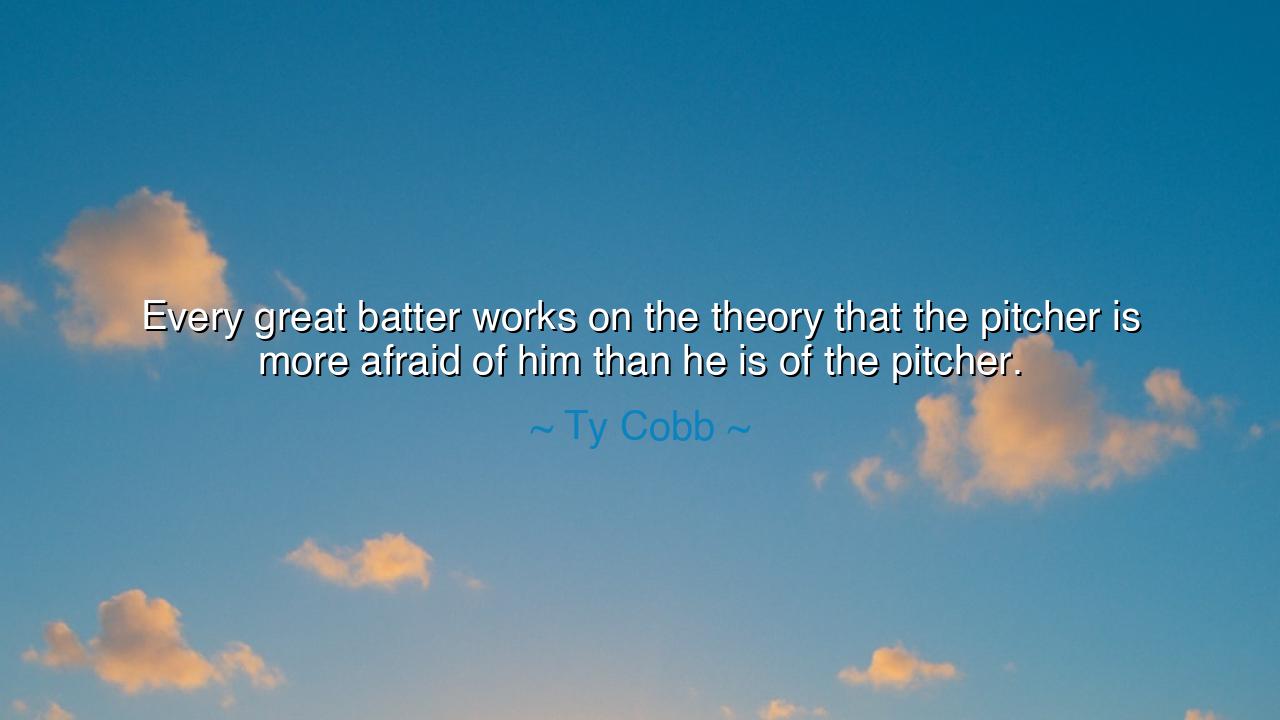
Every great batter works on the theory that the pitcher is more
Every great batter works on the theory that the pitcher is more afraid of him than he is of the pitcher.






When Ty Cobb, the fierce and unrelenting warrior of the diamond, declared, “Every great batter works on the theory that the pitcher is more afraid of him than he is of the pitcher,” he revealed not only a strategy of baseball, but a philosophy of life. For in those words lies the eternal truth of combat, whether of sport, of war, or of daily struggle: victory often belongs not to the one with the greater strength, but to the one with the greater confidence, the one who instills fear rather than succumbs to it.
The origin of this saying is rooted in Cobb’s own career. Known as the “Georgia Peach,” he played with unmatched ferocity, terrorizing pitchers, infielders, and outfielders alike. Cobb did not step into the batter’s box as a mere participant—he strode in as a conqueror. His glare, his stance, his very presence announced that the battle was already tilted in his favor. By convincing himself that the pitcher feared him more than he feared the pitcher, Cobb turned the contest into a psychological duel. His talent was immense, but it was his will, his belief in his own dominance, that made him nearly unstoppable.
The ancients would have recognized this wisdom at once. The Spartans believed that half of victory lay in the intimidation of the enemy before the first spear was thrown. The Romans marched with shields high and drums thundering, not only to prepare themselves, but to break the spirit of those who faced them. So too in baseball: the clash between batter and pitcher is not only of muscle and skill, but of mind and fear. The man who wins the battle of courage often wins the battle of performance.
Consider the story of Babe Ruth’s called shot in the 1932 World Series. Facing the Cubs’ pitcher, Ruth pointed to center field before taking his swing. Whether he truly intended the gesture or not, the effect was undeniable: he placed fear and doubt into the pitcher’s heart and exalted his own confidence. When he crushed the next pitch into the bleachers, it was not merely a home run; it was the embodiment of Cobb’s creed. The batter who convinces the pitcher he is already defeated makes victory not just possible, but inevitable.
The lesson here is clear: in life, as at the plate, your mindset determines your power. If you approach challenges as though they loom larger than you, they will crush you. But if you approach them with the certainty that they fear your determination, your endurance, your will to prevail, then they will falter. Fear reversed is power gained. To live by Cobb’s words is to carry yourself with unshakable resolve, to meet every opponent—be it a person, a hardship, or a dream—with the fire of one who knows he cannot be broken.
What, then, must we do? First, prepare ourselves so that confidence is grounded in real skill. Empty arrogance falters, but true mastery combined with courage creates fear in the heart of opposition. Second, carry yourself with presence: let your posture, your voice, and your gaze proclaim certainty, even when doubt whispers within. Third, remember that courage is contagious—by showing fearlessness, you weaken the resolve of those who stand against you.
Thus, Ty Cobb’s words ring across time: “The pitcher is more afraid of him than he is of the pitcher.” They remind us that greatness is not born solely from talent, but from the spirit that refuses to tremble. Let us step into the batter’s box of life as Cobb once did on the diamond—unyielding, unafraid, and certain that the world itself will yield before the fire of our determination. For in that fearless spirit lies the secret not only of victory, but of immortality.






AAdministratorAdministrator
Welcome, honored guests. Please leave a comment, we will respond soon